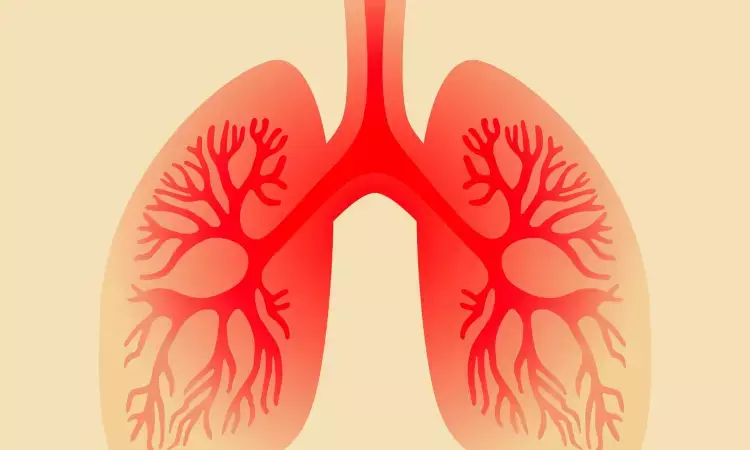- Home
- Medical news & Guidelines
- Anesthesiology
- Cardiology and CTVS
- Critical Care
- Dentistry
- Dermatology
- Diabetes and Endocrinology
- ENT
- Gastroenterology
- Medicine
- Nephrology
- Neurology
- Obstretics-Gynaecology
- Oncology
- Ophthalmology
- Orthopaedics
- Pediatrics-Neonatology
- Psychiatry
- Pulmonology
- Radiology
- Surgery
- Urology
- Laboratory Medicine
- Diet
- Nursing
- Paramedical
- Physiotherapy
- Health news
- Fact Check
- Bone Health Fact Check
- Brain Health Fact Check
- Cancer Related Fact Check
- Child Care Fact Check
- Dental and oral health fact check
- Diabetes and metabolic health fact check
- Diet and Nutrition Fact Check
- Eye and ENT Care Fact Check
- Fitness fact check
- Gut health fact check
- Heart health fact check
- Kidney health fact check
- Medical education fact check
- Men's health fact check
- Respiratory fact check
- Skin and hair care fact check
- Vaccine and Immunization fact check
- Women's health fact check
- AYUSH
- State News
- Andaman and Nicobar Islands
- Andhra Pradesh
- Arunachal Pradesh
- Assam
- Bihar
- Chandigarh
- Chattisgarh
- Dadra and Nagar Haveli
- Daman and Diu
- Delhi
- Goa
- Gujarat
- Haryana
- Himachal Pradesh
- Jammu & Kashmir
- Jharkhand
- Karnataka
- Kerala
- Ladakh
- Lakshadweep
- Madhya Pradesh
- Maharashtra
- Manipur
- Meghalaya
- Mizoram
- Nagaland
- Odisha
- Puducherry
- Punjab
- Rajasthan
- Sikkim
- Tamil Nadu
- Telangana
- Tripura
- Uttar Pradesh
- Uttrakhand
- West Bengal
- Medical Education
- Industry
Tobacco Exposure Doesn't Affect Biologic Treatment for Severe Asthma, Study Shows

Denmark: A recent study published in The Journal of Allergy and Clinical Immunology: In Practice found that ex-smokers with severe asthma respond to biologic treatments as effectively as never-smokers.
The analysis, which included 1,129 patients (44% ex-smokers with varying pack-years), showed significant improvements in asthma control, lung function, exacerbations, and biomarkers after one year of treatment, regardless of smoking history. No major differences in outcomes were observed between never-smokers and ex-smokers.
Randomized trials of biologics in severe, uncontrolled asthma have excluded patients with more than 10 pack-years of cumulative tobacco exposure, leaving a gap in our understanding of how smoking affects the clinical outcomes of biologic treatments in severe asthma. Since many asthma patients are current or former smokers, it is clinically important to investigate how tobacco exposure might influence the effectiveness of biologic therapy.
Marianne Baastrup Soendergaard, Department of Respiratory Medicine, Copenhagen University Hospital–Bispebjerg, Copenhagen, Denmark, and colleagues aimed to explore the impact of smoking history and tobacco exposure on the effectiveness of biologic treatment in real-life patients with severe asthma.
For this purpose, the researchers utilized data from the complete nationwide cohort of patients with severe asthma receiving biologics, sourced from the Danish Severe Asthma Register. They classified patients based on smoking history and cumulative tobacco exposure, then analyzed data at baseline and after 12 months of biologic treatment.
The study led to the following findings:
- 724 bio-naive patients were identified in the Danish Severe Asthma Register.
- Of these, 398 patients had never smoked (55%), 316 were former smokers (44%), and 10 were current smokers (1%).
- Among the current and former smokers, 37% had 1 to 9 pack-years of tobacco exposure, 26% had 10 to 19 pack-years, and 37% had 20 or more pack-years.
- Patients with tobacco exposure experienced similar reductions in the number of exacerbations, reductions in maintenance oral corticosteroid use, and improvements in asthma symptoms compared to patients with no tobacco exposure (0 pack-years).
The provides valuable insights into the impact of smoking history on the effectiveness of biologics in patients with severe asthma. Nearly half of the patients in this real-life cohort had significant smoking histories, highlighting the clinical relevance of the findings. Given the high cost and limited availability of biologic drugs, it is crucial to identify patients who will benefit from treatment. The study shows that smoking history and tobacco exposure do not affect the beneficial effects of biologics in these patients.
"Therefore, biologics should be prescribed to patients with severe asthma and a significant smoking history using the same criteria as for non-smokers. However, due to the small number of current smokers in the study, further research is needed to assess the impact of active smoking on biologic treatment outcomes," the researchers wrote.
Reference:
Baastrup Soendergaard M, Hansen S, Bjerrum AS, von Bülow A, Haakansson KEJ, Hilberg O, Ingebrigtsen TS, Johnsen CR, Lock-Johansson S, Makowska Rasmussen L, Schmid JM, Ulrik CS, Porsbjerg C. Tobacco Exposure and Efficacy of Biologic Therapy in Patients With Severe Asthma: A Nationwide Study From the Danish Severe Asthma Register. J Allergy Clin Immunol Pract. 2024 Jan;12(1):146-155.e5. doi: 10.1016/j.jaip.2023.10.012. Epub 2023 Oct 11. PMID: 37832820.
Dr Kamal Kant Kohli-MBBS, DTCD- a chest specialist with more than 30 years of practice and a flair for writing clinical articles, Dr Kamal Kant Kohli joined Medical Dialogues as a Chief Editor of Medical News. Besides writing articles, as an editor, he proofreads and verifies all the medical content published on Medical Dialogues including those coming from journals, studies,medical conferences,guidelines etc. Email: drkohli@medicaldialogues.in. Contact no. 011-43720751


